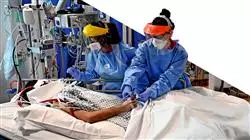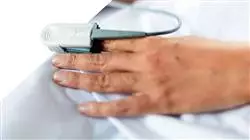University certificate
The world's largest faculty of nursing”
Introduction to the Program
You will get a complete update in Advanced Life Support in Intensive Care Nursing in 6 months”

The transformation of Intensive Care Units thanks to new technologies is notorious. In this sense, the nurse is surrounded by much more precise equipment for patient monitoring, with smaller, wireless and portable devices. At the same time, there have been advances in the procedures and techniques used to care for the critically ill person.
Faced with this reality, the healthcare professional requires continuous updating of his or her competencies and care skills, allowing him or her to integrate the most significant advances in his or her praxis. This Postgraduate diploma in Advanced Life Support in Intensive Care Nursing is born with this intention.
It is a program that will lead the graduate to deepen in the protocols used in the care of the critical patient or with Cardiovascular Disorders. In this sense, from a theoretical-practical perspective, they will delve into the most effective techniques for performing cardiac stimulation with pacemakers, cardiopulmonary resuscitation and mastering the post-resuscitation period.
All this, accompanied by multimedia didactic resources, specialized readings and clinical case studies that will lead you to integrate into your practice, the most effective methodology and strategies for patient management in the ICU.
Undoubtedly, a unique opportunity to keep abreast of advances in this field through a 100% online, flexible and convenient university degree. The graduate only needs a digital device with internet connection to visualize, the content hosted on the virtual platform at any time of day. An ideal opportunity to study an avant-garde degree, compatible with daily responsibilities.
Enhance your nursing leadership skills in decision making around isolation and management of the critically ill patient”
This Postgraduate diploma in Advanced Life Support in Intensive Care Nursing contains the most complete and up-to-date scientific program on the market. The most important features include:
- The development of case studies presented by experts in Intensive Care Nursing and Intensive Care Physicians
- The graphic, schematic, and practical contents with which they are created, provide scientific and practical information on the disciplines that are essential for professional practice
- Practical exercises where self-assessment can be used to improve learning
- Its special emphasis on innovative methodologies
- Theoretical lessons, questions to the expert, debate forums on controversial topics, and individual reflection assignments
- Content that is accessible from any fixed or portable device with an Internet connection
Delve your knowledge on invasive monitoring II: GC, PAP and other parameters through the best didactic material”
The program’s teaching staff includes professionals from sector who contribute their work experience to this educational program, as well as renowned specialists from leading societies and prestigious universities.
Its multimedia content, developed with the latest educational technology, will provide the professional with situated and contextual learning, i.e., a simulated environment that will provide an immersive education programmed to learn in real situations.
The design of this program focuses on Problem-Based Learning, by means of which the professional must try to solve the different professional practice situations that are presented throughout the academic course. For this purpose, the student will be assisted by an innovative interactive video system created by renowned experts.
Thanks to the Relearning method you will reduce study hours and consolidate key concepts in a much easier way"

You will learn in depth the advances for the interpretation of data values with invasive and non-invasive monitoring to anticipate future problems"
Why study at TECH?
TECH is the world’s largest online university. With an impressive catalog of more than 14,000 university programs available in 11 languages, it is positioned as a leader in employability, with a 99% job placement rate. In addition, it relies on an enormous faculty of more than 6,000 professors of the highest international renown.

Study at the world's largest online university and guarantee your professional success. The future starts at TECH”
The world’s best online university according to FORBES
The prestigious Forbes magazine, specialized in business and finance, has highlighted TECH as “the world's best online university” This is what they have recently stated in an article in their digital edition in which they echo the success story of this institution, “thanks to the academic offer it provides, the selection of its teaching staff, and an innovative learning method aimed at educating the professionals of the future”
A revolutionary study method, a cutting-edge faculty and a practical focus: the key to TECH's success.
The most complete study plans on the university scene
TECH offers the most complete study plans on the university scene, with syllabuses that cover fundamental concepts and, at the same time, the main scientific advances in their specific scientific areas. In addition, these programs are continuously being updated to guarantee students the academic vanguard and the most in-demand professional skills. In this way, the university's qualifications provide its graduates with a significant advantage to propel their careers to success.
TECH offers the most comprehensive and intensive study plans on the current university scene.
A world-class teaching staff
TECH's teaching staff is made up of more than 6,000 professors with the highest international recognition. Professors, researchers and top executives of multinational companies, including Isaiah Covington, performance coach of the Boston Celtics; Magda Romanska, principal investigator at Harvard MetaLAB; Ignacio Wistumba, chairman of the department of translational molecular pathology at MD Anderson Cancer Center; and D.W. Pine, creative director of TIME magazine, among others.
Internationally renowned experts, specialized in different branches of Health, Technology, Communication and Business, form part of the TECH faculty.
A unique learning method
TECH is the first university to use Relearning in all its programs. It is the best online learning methodology, accredited with international teaching quality certifications, provided by prestigious educational agencies. In addition, this disruptive educational model is complemented with the “Case Method”, thereby setting up a unique online teaching strategy. Innovative teaching resources are also implemented, including detailed videos, infographics and interactive summaries.
TECH combines Relearning and the Case Method in all its university programs to guarantee excellent theoretical and practical learning, studying whenever and wherever you want.
The world's largest online university
TECH is the world’s largest online university. We are the largest educational institution, with the best and widest online educational catalog, one hundred percent online and covering the vast majority of areas of knowledge. We offer a large selection of our own degrees and accredited online undergraduate and postgraduate degrees. In total, more than 14,000 university degrees, in eleven different languages, make us the largest educational largest in the world.
TECH has the world's most extensive catalog of academic and official programs, available in more than 11 languages.
Google Premier Partner
The American technology giant has awarded TECH the Google Google Premier Partner badge. This award, which is only available to 3% of the world's companies, highlights the efficient, flexible and tailored experience that this university provides to students. The recognition as a Google Premier Partner not only accredits the maximum rigor, performance and investment in TECH's digital infrastructures, but also places this university as one of the world's leading technology companies.
Google has positioned TECH in the top 3% of the world's most important technology companies by awarding it its Google Premier Partner badge.
The official online university of the NBA
TECH is the official online university of the NBA. Thanks to our agreement with the biggest league in basketball, we offer our students exclusive university programs, as well as a wide variety of educational resources focused on the business of the league and other areas of the sports industry. Each program is made up of a uniquely designed syllabus and features exceptional guest hosts: professionals with a distinguished sports background who will offer their expertise on the most relevant topics.
TECH has been selected by the NBA, the world's top basketball league, as its official online university.
The top-rated university by its students
Students have positioned TECH as the world's top-rated university on the main review websites, with a highest rating of 4.9 out of 5, obtained from more than 1,000 reviews. These results consolidate TECH as the benchmark university institution at an international level, reflecting the excellence and positive impact of its educational model.” reflecting the excellence and positive impact of its educational model.”
TECH is the world’s top-rated university by its students.
Leaders in employability
TECH has managed to become the leading university in employability. 99% of its students obtain jobs in the academic field they have studied, within one year of completing any of the university's programs. A similar number achieve immediate career enhancement. All this thanks to a study methodology that bases its effectiveness on the acquisition of practical skills, which are absolutely necessary for professional development.
99% of TECH graduates find a job within a year of completing their studies.
Postgraduate Diploma in Advanced Life Support in Intensive Care Nursing
Prepare yourself to be an expert in critical patient care with our Postgraduate Diploma in Advanced Life Support in Intensive Care Nursing, taught by TECH Global University! In the field of Intensive Nursing, every second counts and every decision is crucial. That's why we've designed this specialized program to give you the knowledge and skills you need to meet the challenges of medical care in emergency and intensive care situations. And best of all, you'll do it from the comfort of your own home thanks to our online mode of study.
The best education you can get.
The best education is here with TECH
TECH Global University is committed to academic excellence and training highly competent professionals. With our Postgraduate Diploma in Advanced Life Support in Intensive Nursing, you'll have access to a comprehensive, up-to-date curriculum designed by experts in the healthcare field. You will learn how to quickly identify critical conditions, perform accurate assessments and apply advanced life support techniques to ensure the stabilization and recovery of critically ill patients. Our program will provide you with comprehensive preparation in the management of emergency situations, from cardiopulmonary resuscitation (CPR) to the proper use of state-of-the-art equipment and medications. In addition, we will train you to make quick and effective decisions, working in multidisciplinary teams to provide the best possible care. Upon successful completion of the Postgraduate Diploma in Advanced Life Support in Intensive Care Nursing, you will receive a university certificate that will support your skills and open doors in the competitive field of intensive care nursing. You'll be ready to take on leadership roles in intensive care units, hospitals and prestigious medical centers. Don't miss this opportunity to excel as a healthcare professional and make a difference in the lives of critically ill patients. Enroll now in our Postgraduate Diploma in Advanced Life Support in Intensive Care Nursing and take your career to the next level!
"







